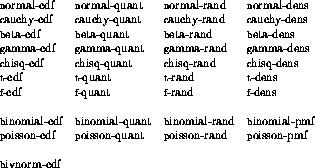
XLISP-STAT has several functions for generating pseudo-random numbers. For example, the expression
(uniform-rand 50)will generate a list of 50 independent uniform random variables. The functions normal-rand and cauchy-rand work similarly. Other generating functions require additional arguments to specify distribution parameters. Here is a list of the functions available for dealing with probability distributions:

More information on the required arguments is given in the appendix
in Section
![]() . The discrete quantile functions
binomial-quant and
poisson-quant return values of a left
continuous inverse of the cdf. The pmf's for these distributions are
only defined for integer arguments. The quantile functions and random
variable generators for the beta, gamma,
. The discrete quantile functions
binomial-quant and
poisson-quant return values of a left
continuous inverse of the cdf. The pmf's for these distributions are
only defined for integer arguments. The quantile functions and random
variable generators for the beta, gamma,
 , t and F
distributions are presently calculated by inverting the cdf and may
be a bit slow.
, t and F
distributions are presently calculated by inverting the cdf and may
be a bit slow.
The state of the internal random number generator can be ``randomly''
reseeded, and the current value of the generator state can be saved. The
mechanism used is the standard Common Lisp mechanism. The current random
state is held in the variable
*random-state*
. The function
make-random-state
can be used to set and save the state. It
takes an optional argument. If the argument is
NIL
or omitted
make-random-state
returns a copy of the current value of
*random-state*
. If the argument is a state object a copy of it
is returned. If the argument is
t
a new, ``randomly''
initialized state object is produced and returned.
![]()
Anthony Rossini